Analysis of Leadership and Management Skills at Unilever: A Report
VerifiedAdded on 2022/12/22
|12
|3052
|2
Report
AI Summary
This report provides an analysis of leadership and management skills, using Unilever as a case study. It begins with an introduction defining management and leadership, and then compares and contrasts the two concepts. The main body of the report delves into various management and leadership theories, including bureaucratic management, system management, Theory X and Y, transformational leadership, and situational leadership, providing examples of their application within Unilever. Key performance metrics (KPIs) for the organizational sector are examined, including their advantages and disadvantages. The report also explores organizational leadership and management performance, highlighting the roles and skills of leaders and the importance of performance management. The report concludes by summarizing the key findings and insights gained from the analysis, offering a comprehensive overview of leadership and management practices within a multinational corporation.
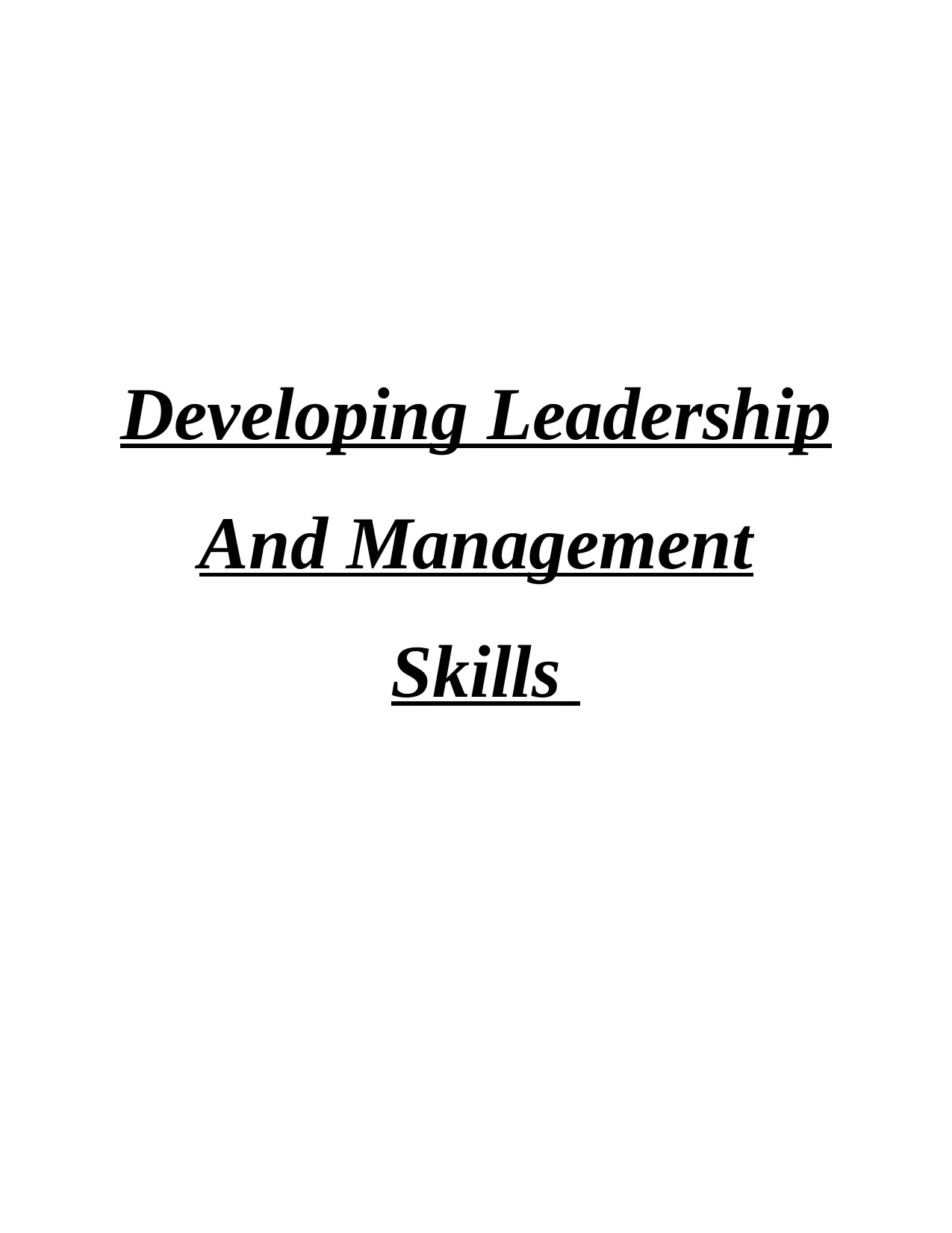
Developing Leadership
And Management
Skills
And Management
Skills
Paraphrase This Document
Need a fresh take? Get an instant paraphrase of this document with our AI Paraphraser
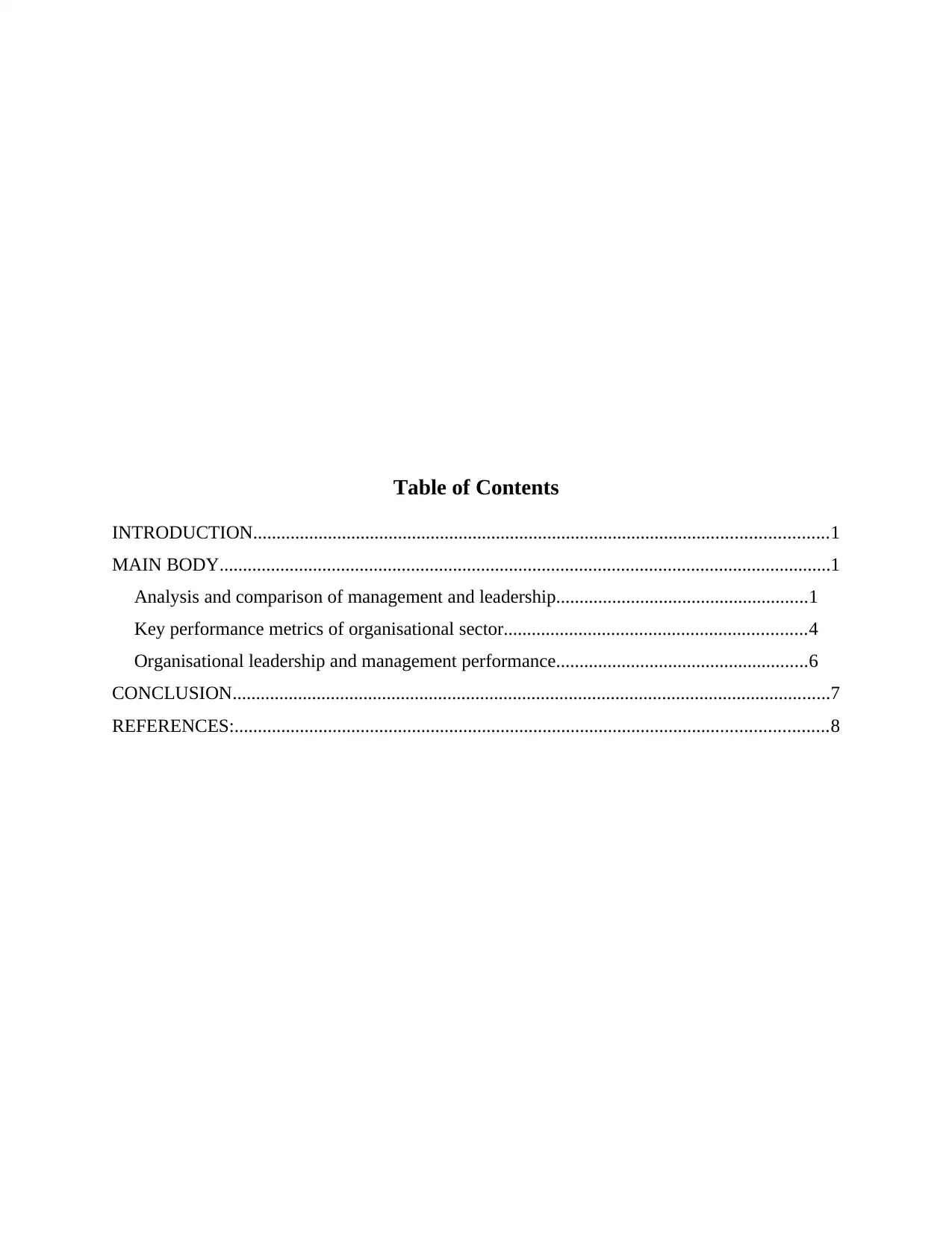
Table of Contents
INTRODUCTION...........................................................................................................................1
MAIN BODY...................................................................................................................................1
Analysis and comparison of management and leadership......................................................1
Key performance metrics of organisational sector.................................................................4
Organisational leadership and management performance......................................................6
CONCLUSION................................................................................................................................7
REFERENCES:...............................................................................................................................8
INTRODUCTION...........................................................................................................................1
MAIN BODY...................................................................................................................................1
Analysis and comparison of management and leadership......................................................1
Key performance metrics of organisational sector.................................................................4
Organisational leadership and management performance......................................................6
CONCLUSION................................................................................................................................7
REFERENCES:...............................................................................................................................8

⊘ This is a preview!⊘
Do you want full access?
Subscribe today to unlock all pages.

Trusted by 1+ million students worldwide
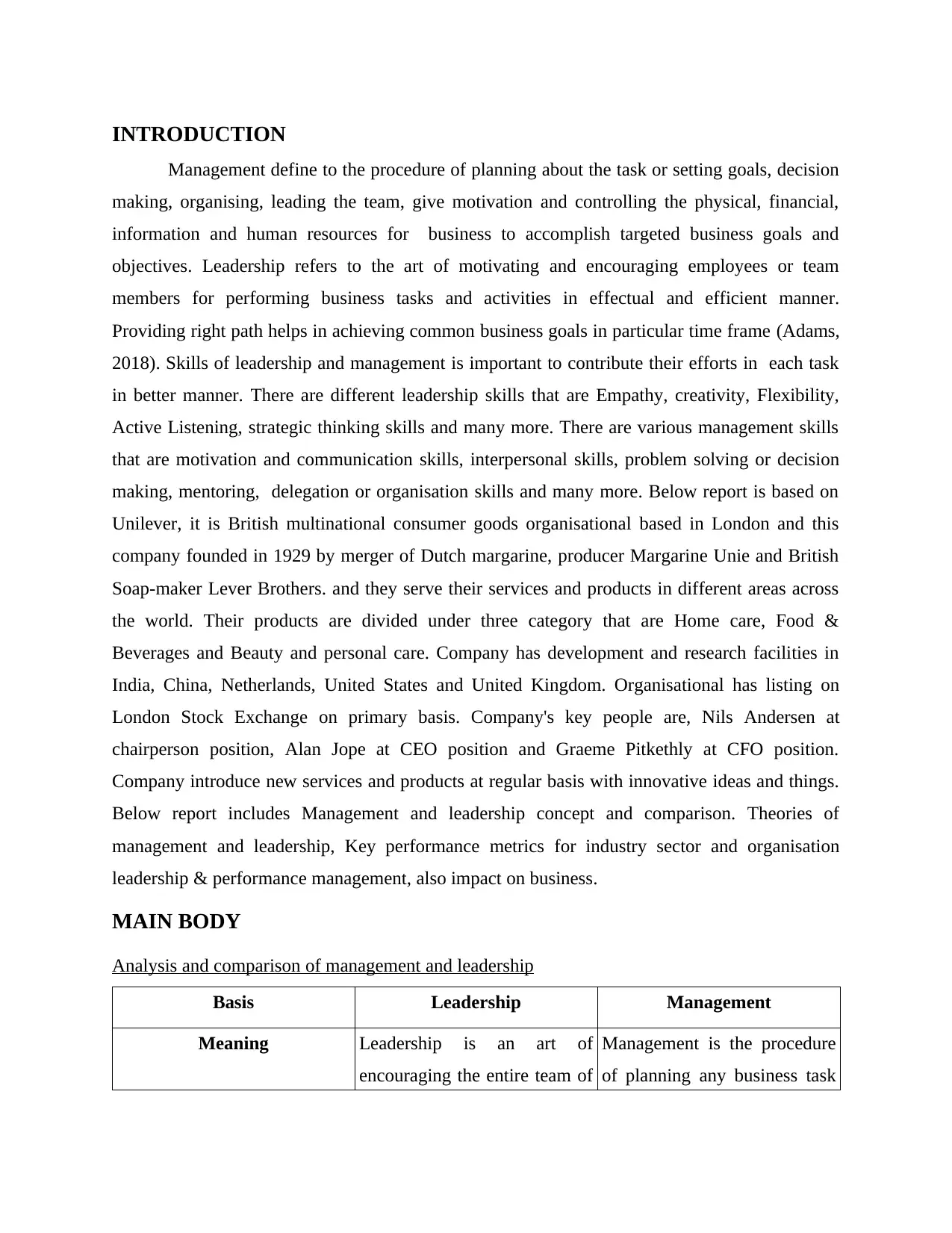
INTRODUCTION
Management define to the procedure of planning about the task or setting goals, decision
making, organising, leading the team, give motivation and controlling the physical, financial,
information and human resources for business to accomplish targeted business goals and
objectives. Leadership refers to the art of motivating and encouraging employees or team
members for performing business tasks and activities in effectual and efficient manner.
Providing right path helps in achieving common business goals in particular time frame (Adams,
2018). Skills of leadership and management is important to contribute their efforts in each task
in better manner. There are different leadership skills that are Empathy, creativity, Flexibility,
Active Listening, strategic thinking skills and many more. There are various management skills
that are motivation and communication skills, interpersonal skills, problem solving or decision
making, mentoring, delegation or organisation skills and many more. Below report is based on
Unilever, it is British multinational consumer goods organisational based in London and this
company founded in 1929 by merger of Dutch margarine, producer Margarine Unie and British
Soap-maker Lever Brothers. and they serve their services and products in different areas across
the world. Their products are divided under three category that are Home care, Food &
Beverages and Beauty and personal care. Company has development and research facilities in
India, China, Netherlands, United States and United Kingdom. Organisational has listing on
London Stock Exchange on primary basis. Company's key people are, Nils Andersen at
chairperson position, Alan Jope at CEO position and Graeme Pitkethly at CFO position.
Company introduce new services and products at regular basis with innovative ideas and things.
Below report includes Management and leadership concept and comparison. Theories of
management and leadership, Key performance metrics for industry sector and organisation
leadership & performance management, also impact on business.
MAIN BODY
Analysis and comparison of management and leadership
Basis Leadership Management
Meaning Leadership is an art of
encouraging the entire team of
Management is the procedure
of planning any business task
Management define to the procedure of planning about the task or setting goals, decision
making, organising, leading the team, give motivation and controlling the physical, financial,
information and human resources for business to accomplish targeted business goals and
objectives. Leadership refers to the art of motivating and encouraging employees or team
members for performing business tasks and activities in effectual and efficient manner.
Providing right path helps in achieving common business goals in particular time frame (Adams,
2018). Skills of leadership and management is important to contribute their efforts in each task
in better manner. There are different leadership skills that are Empathy, creativity, Flexibility,
Active Listening, strategic thinking skills and many more. There are various management skills
that are motivation and communication skills, interpersonal skills, problem solving or decision
making, mentoring, delegation or organisation skills and many more. Below report is based on
Unilever, it is British multinational consumer goods organisational based in London and this
company founded in 1929 by merger of Dutch margarine, producer Margarine Unie and British
Soap-maker Lever Brothers. and they serve their services and products in different areas across
the world. Their products are divided under three category that are Home care, Food &
Beverages and Beauty and personal care. Company has development and research facilities in
India, China, Netherlands, United States and United Kingdom. Organisational has listing on
London Stock Exchange on primary basis. Company's key people are, Nils Andersen at
chairperson position, Alan Jope at CEO position and Graeme Pitkethly at CFO position.
Company introduce new services and products at regular basis with innovative ideas and things.
Below report includes Management and leadership concept and comparison. Theories of
management and leadership, Key performance metrics for industry sector and organisation
leadership & performance management, also impact on business.
MAIN BODY
Analysis and comparison of management and leadership
Basis Leadership Management
Meaning Leadership is an art of
encouraging the entire team of
Management is the procedure
of planning any business task
Paraphrase This Document
Need a fresh take? Get an instant paraphrase of this document with our AI Paraphraser
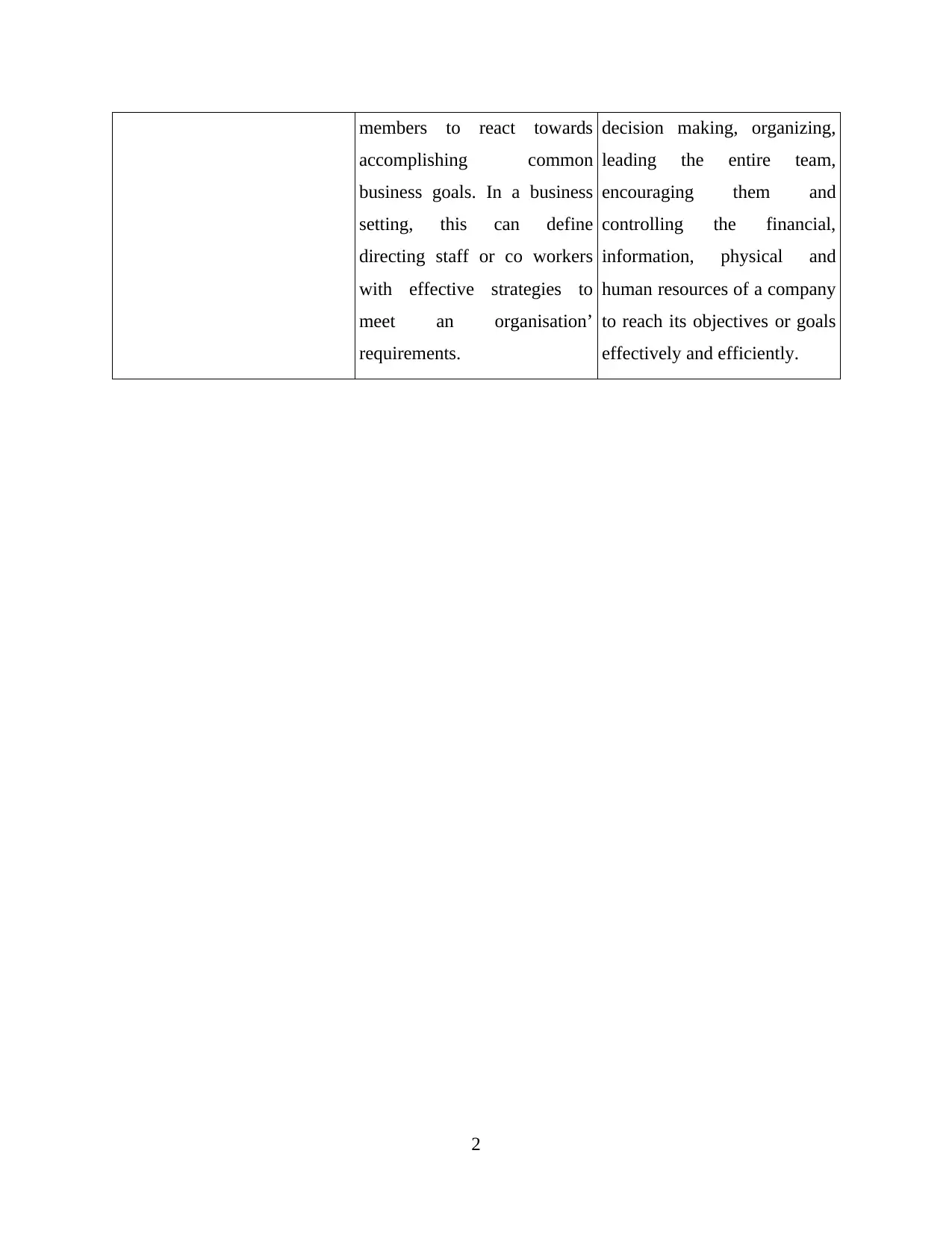
members to react towards
accomplishing common
business goals. In a business
setting, this can define
directing staff or co workers
with effective strategies to
meet an organisation’
requirements.
decision making, organizing,
leading the entire team,
encouraging them and
controlling the financial,
information, physical and
human resources of a company
to reach its objectives or goals
effectively and efficiently.
2
accomplishing common
business goals. In a business
setting, this can define
directing staff or co workers
with effective strategies to
meet an organisation’
requirements.
decision making, organizing,
leading the entire team,
encouraging them and
controlling the financial,
information, physical and
human resources of a company
to reach its objectives or goals
effectively and efficiently.
2
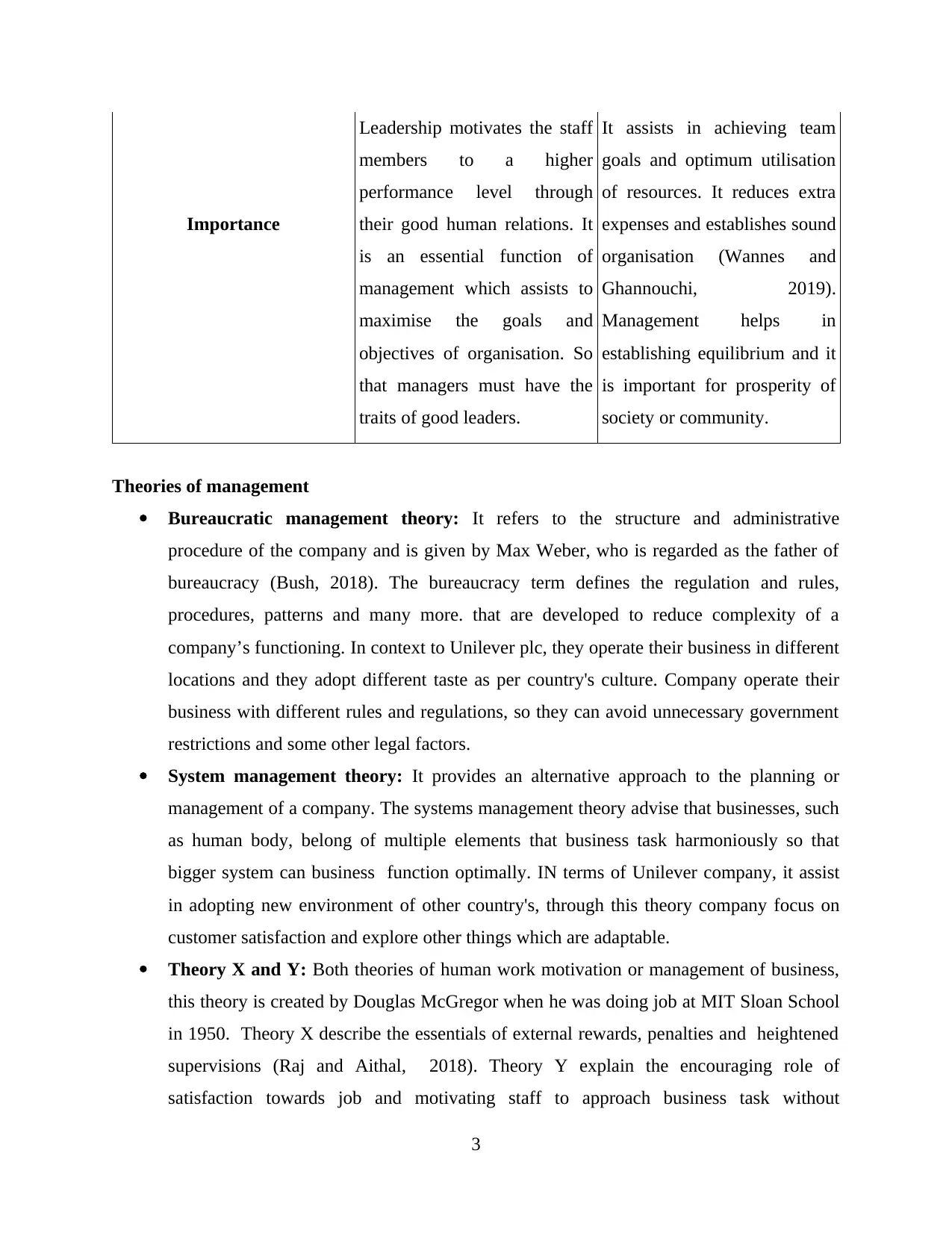
Importance
Leadership motivates the staff
members to a higher
performance level through
their good human relations. It
is an essential function of
management which assists to
maximise the goals and
objectives of organisation. So
that managers must have the
traits of good leaders.
It assists in achieving team
goals and optimum utilisation
of resources. It reduces extra
expenses and establishes sound
organisation (Wannes and
Ghannouchi, 2019).
Management helps in
establishing equilibrium and it
is important for prosperity of
society or community.
Theories of management
Bureaucratic management theory: It refers to the structure and administrative
procedure of the company and is given by Max Weber, who is regarded as the father of
bureaucracy (Bush, 2018). The bureaucracy term defines the regulation and rules,
procedures, patterns and many more. that are developed to reduce complexity of a
company’s functioning. In context to Unilever plc, they operate their business in different
locations and they adopt different taste as per country's culture. Company operate their
business with different rules and regulations, so they can avoid unnecessary government
restrictions and some other legal factors.
System management theory: It provides an alternative approach to the planning or
management of a company. The systems management theory advise that businesses, such
as human body, belong of multiple elements that business task harmoniously so that
bigger system can business function optimally. IN terms of Unilever company, it assist
in adopting new environment of other country's, through this theory company focus on
customer satisfaction and explore other things which are adaptable.
Theory X and Y: Both theories of human work motivation or management of business,
this theory is created by Douglas McGregor when he was doing job at MIT Sloan School
in 1950. Theory X describe the essentials of external rewards, penalties and heightened
supervisions (Raj and Aithal, 2018). Theory Y explain the encouraging role of
satisfaction towards job and motivating staff to approach business task without
3
Leadership motivates the staff
members to a higher
performance level through
their good human relations. It
is an essential function of
management which assists to
maximise the goals and
objectives of organisation. So
that managers must have the
traits of good leaders.
It assists in achieving team
goals and optimum utilisation
of resources. It reduces extra
expenses and establishes sound
organisation (Wannes and
Ghannouchi, 2019).
Management helps in
establishing equilibrium and it
is important for prosperity of
society or community.
Theories of management
Bureaucratic management theory: It refers to the structure and administrative
procedure of the company and is given by Max Weber, who is regarded as the father of
bureaucracy (Bush, 2018). The bureaucracy term defines the regulation and rules,
procedures, patterns and many more. that are developed to reduce complexity of a
company’s functioning. In context to Unilever plc, they operate their business in different
locations and they adopt different taste as per country's culture. Company operate their
business with different rules and regulations, so they can avoid unnecessary government
restrictions and some other legal factors.
System management theory: It provides an alternative approach to the planning or
management of a company. The systems management theory advise that businesses, such
as human body, belong of multiple elements that business task harmoniously so that
bigger system can business function optimally. IN terms of Unilever company, it assist
in adopting new environment of other country's, through this theory company focus on
customer satisfaction and explore other things which are adaptable.
Theory X and Y: Both theories of human work motivation or management of business,
this theory is created by Douglas McGregor when he was doing job at MIT Sloan School
in 1950. Theory X describe the essentials of external rewards, penalties and heightened
supervisions (Raj and Aithal, 2018). Theory Y explain the encouraging role of
satisfaction towards job and motivating staff to approach business task without
3
⊘ This is a preview!⊘
Do you want full access?
Subscribe today to unlock all pages.

Trusted by 1+ million students worldwide
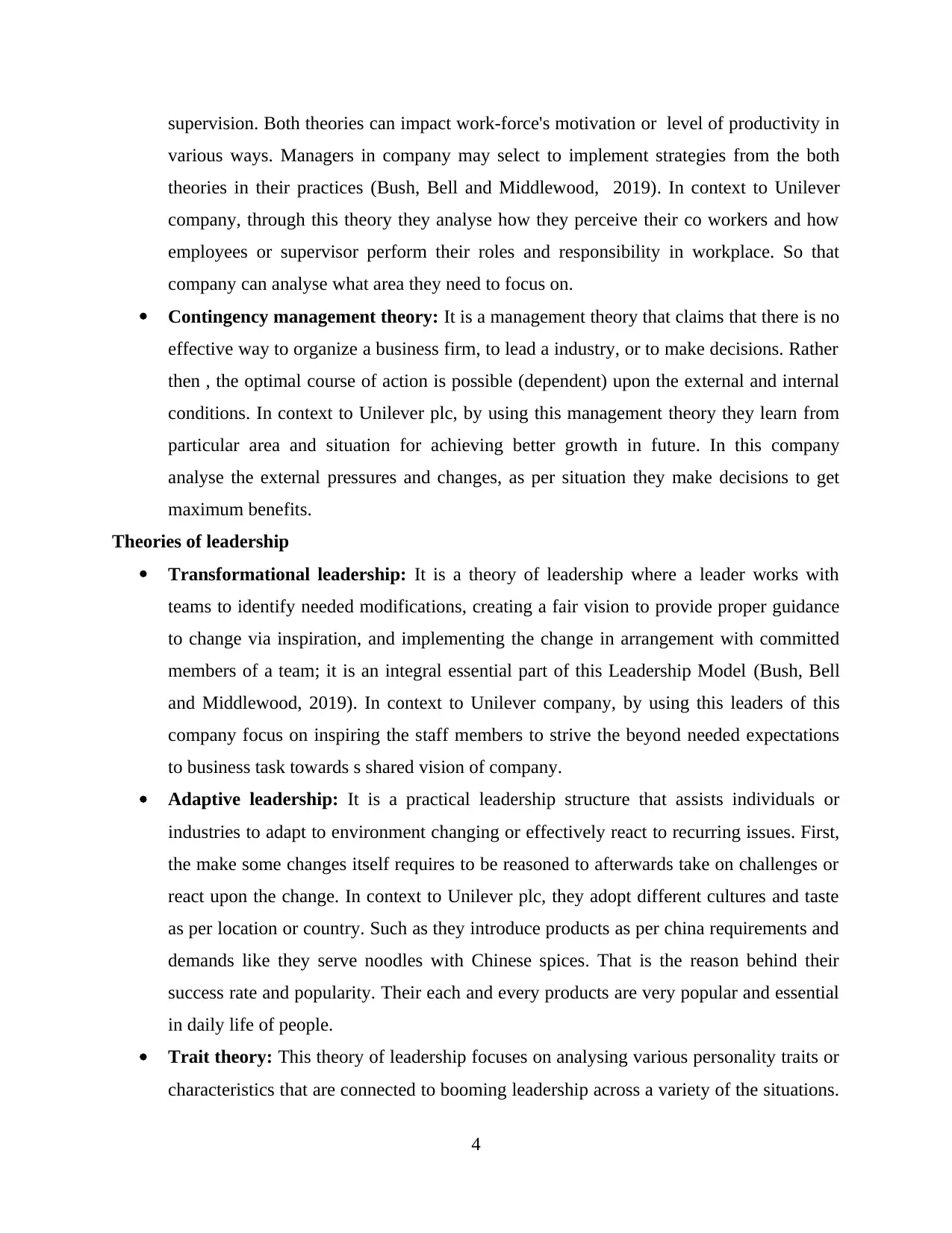
supervision. Both theories can impact work-force's motivation or level of productivity in
various ways. Managers in company may select to implement strategies from the both
theories in their practices (Bush, Bell and Middlewood, 2019). In context to Unilever
company, through this theory they analyse how they perceive their co workers and how
employees or supervisor perform their roles and responsibility in workplace. So that
company can analyse what area they need to focus on.
Contingency management theory: It is a management theory that claims that there is no
effective way to organize a business firm, to lead a industry, or to make decisions. Rather
then , the optimal course of action is possible (dependent) upon the external and internal
conditions. In context to Unilever plc, by using this management theory they learn from
particular area and situation for achieving better growth in future. In this company
analyse the external pressures and changes, as per situation they make decisions to get
maximum benefits.
Theories of leadership
Transformational leadership: It is a theory of leadership where a leader works with
teams to identify needed modifications, creating a fair vision to provide proper guidance
to change via inspiration, and implementing the change in arrangement with committed
members of a team; it is an integral essential part of this Leadership Model (Bush, Bell
and Middlewood, 2019). In context to Unilever company, by using this leaders of this
company focus on inspiring the staff members to strive the beyond needed expectations
to business task towards s shared vision of company.
Adaptive leadership: It is a practical leadership structure that assists individuals or
industries to adapt to environment changing or effectively react to recurring issues. First,
the make some changes itself requires to be reasoned to afterwards take on challenges or
react upon the change. In context to Unilever plc, they adopt different cultures and taste
as per location or country. Such as they introduce products as per china requirements and
demands like they serve noodles with Chinese spices. That is the reason behind their
success rate and popularity. Their each and every products are very popular and essential
in daily life of people.
Trait theory: This theory of leadership focuses on analysing various personality traits or
characteristics that are connected to booming leadership across a variety of the situations.
4
various ways. Managers in company may select to implement strategies from the both
theories in their practices (Bush, Bell and Middlewood, 2019). In context to Unilever
company, through this theory they analyse how they perceive their co workers and how
employees or supervisor perform their roles and responsibility in workplace. So that
company can analyse what area they need to focus on.
Contingency management theory: It is a management theory that claims that there is no
effective way to organize a business firm, to lead a industry, or to make decisions. Rather
then , the optimal course of action is possible (dependent) upon the external and internal
conditions. In context to Unilever plc, by using this management theory they learn from
particular area and situation for achieving better growth in future. In this company
analyse the external pressures and changes, as per situation they make decisions to get
maximum benefits.
Theories of leadership
Transformational leadership: It is a theory of leadership where a leader works with
teams to identify needed modifications, creating a fair vision to provide proper guidance
to change via inspiration, and implementing the change in arrangement with committed
members of a team; it is an integral essential part of this Leadership Model (Bush, Bell
and Middlewood, 2019). In context to Unilever company, by using this leaders of this
company focus on inspiring the staff members to strive the beyond needed expectations
to business task towards s shared vision of company.
Adaptive leadership: It is a practical leadership structure that assists individuals or
industries to adapt to environment changing or effectively react to recurring issues. First,
the make some changes itself requires to be reasoned to afterwards take on challenges or
react upon the change. In context to Unilever plc, they adopt different cultures and taste
as per location or country. Such as they introduce products as per china requirements and
demands like they serve noodles with Chinese spices. That is the reason behind their
success rate and popularity. Their each and every products are very popular and essential
in daily life of people.
Trait theory: This theory of leadership focuses on analysing various personality traits or
characteristics that are connected to booming leadership across a variety of the situations.
4
Paraphrase This Document
Need a fresh take? Get an instant paraphrase of this document with our AI Paraphraser
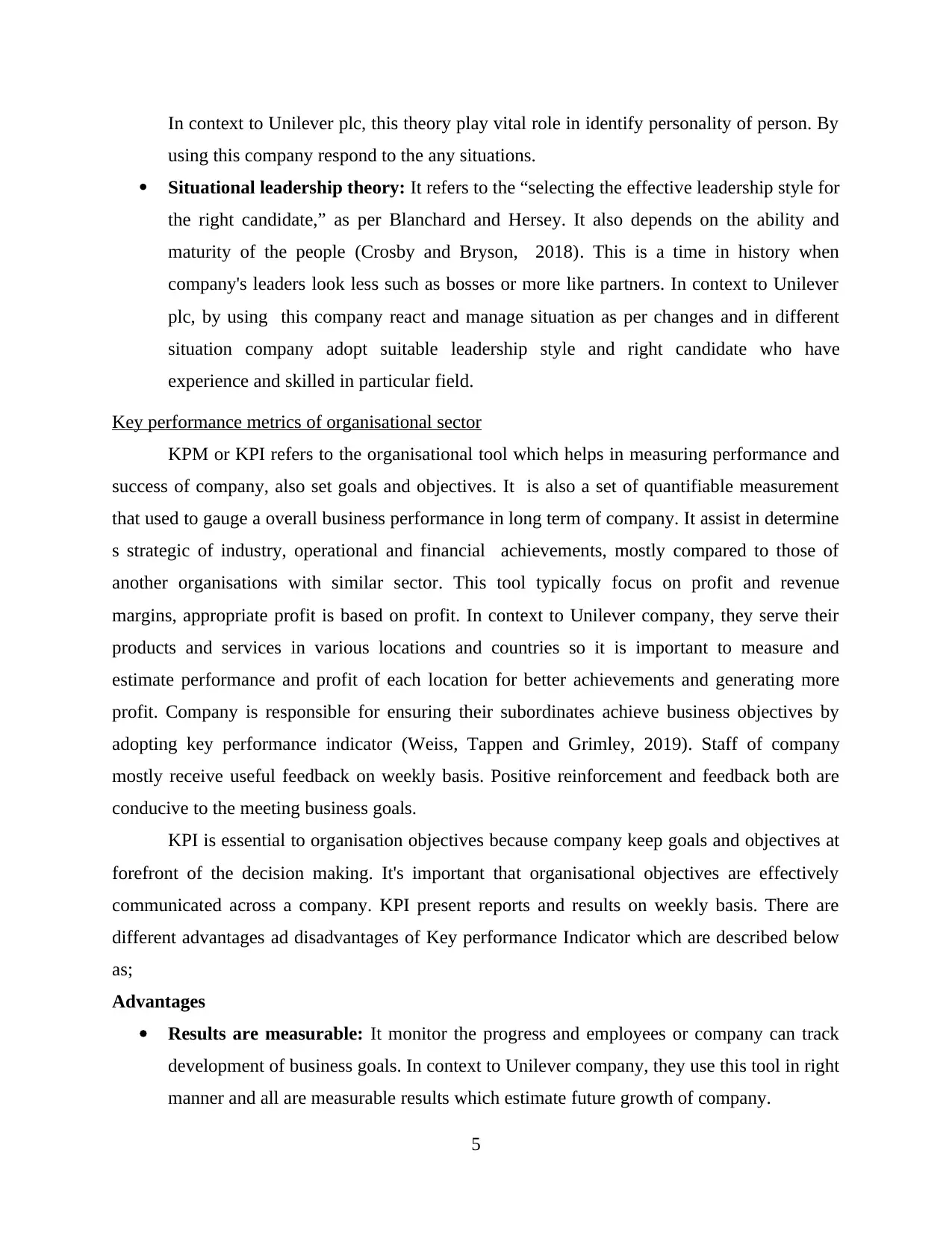
In context to Unilever plc, this theory play vital role in identify personality of person. By
using this company respond to the any situations.
Situational leadership theory: It refers to the “selecting the effective leadership style for
the right candidate,” as per Blanchard and Hersey. It also depends on the ability and
maturity of the people (Crosby and Bryson, 2018). This is a time in history when
company's leaders look less such as bosses or more like partners. In context to Unilever
plc, by using this company react and manage situation as per changes and in different
situation company adopt suitable leadership style and right candidate who have
experience and skilled in particular field.
Key performance metrics of organisational sector
KPM or KPI refers to the organisational tool which helps in measuring performance and
success of company, also set goals and objectives. It is also a set of quantifiable measurement
that used to gauge a overall business performance in long term of company. It assist in determine
s strategic of industry, operational and financial achievements, mostly compared to those of
another organisations with similar sector. This tool typically focus on profit and revenue
margins, appropriate profit is based on profit. In context to Unilever company, they serve their
products and services in various locations and countries so it is important to measure and
estimate performance and profit of each location for better achievements and generating more
profit. Company is responsible for ensuring their subordinates achieve business objectives by
adopting key performance indicator (Weiss, Tappen and Grimley, 2019). Staff of company
mostly receive useful feedback on weekly basis. Positive reinforcement and feedback both are
conducive to the meeting business goals.
KPI is essential to organisation objectives because company keep goals and objectives at
forefront of the decision making. It's important that organisational objectives are effectively
communicated across a company. KPI present reports and results on weekly basis. There are
different advantages ad disadvantages of Key performance Indicator which are described below
as;
Advantages
Results are measurable: It monitor the progress and employees or company can track
development of business goals. In context to Unilever company, they use this tool in right
manner and all are measurable results which estimate future growth of company.
5
using this company respond to the any situations.
Situational leadership theory: It refers to the “selecting the effective leadership style for
the right candidate,” as per Blanchard and Hersey. It also depends on the ability and
maturity of the people (Crosby and Bryson, 2018). This is a time in history when
company's leaders look less such as bosses or more like partners. In context to Unilever
plc, by using this company react and manage situation as per changes and in different
situation company adopt suitable leadership style and right candidate who have
experience and skilled in particular field.
Key performance metrics of organisational sector
KPM or KPI refers to the organisational tool which helps in measuring performance and
success of company, also set goals and objectives. It is also a set of quantifiable measurement
that used to gauge a overall business performance in long term of company. It assist in determine
s strategic of industry, operational and financial achievements, mostly compared to those of
another organisations with similar sector. This tool typically focus on profit and revenue
margins, appropriate profit is based on profit. In context to Unilever company, they serve their
products and services in various locations and countries so it is important to measure and
estimate performance and profit of each location for better achievements and generating more
profit. Company is responsible for ensuring their subordinates achieve business objectives by
adopting key performance indicator (Weiss, Tappen and Grimley, 2019). Staff of company
mostly receive useful feedback on weekly basis. Positive reinforcement and feedback both are
conducive to the meeting business goals.
KPI is essential to organisation objectives because company keep goals and objectives at
forefront of the decision making. It's important that organisational objectives are effectively
communicated across a company. KPI present reports and results on weekly basis. There are
different advantages ad disadvantages of Key performance Indicator which are described below
as;
Advantages
Results are measurable: It monitor the progress and employees or company can track
development of business goals. In context to Unilever company, they use this tool in right
manner and all are measurable results which estimate future growth of company.
5
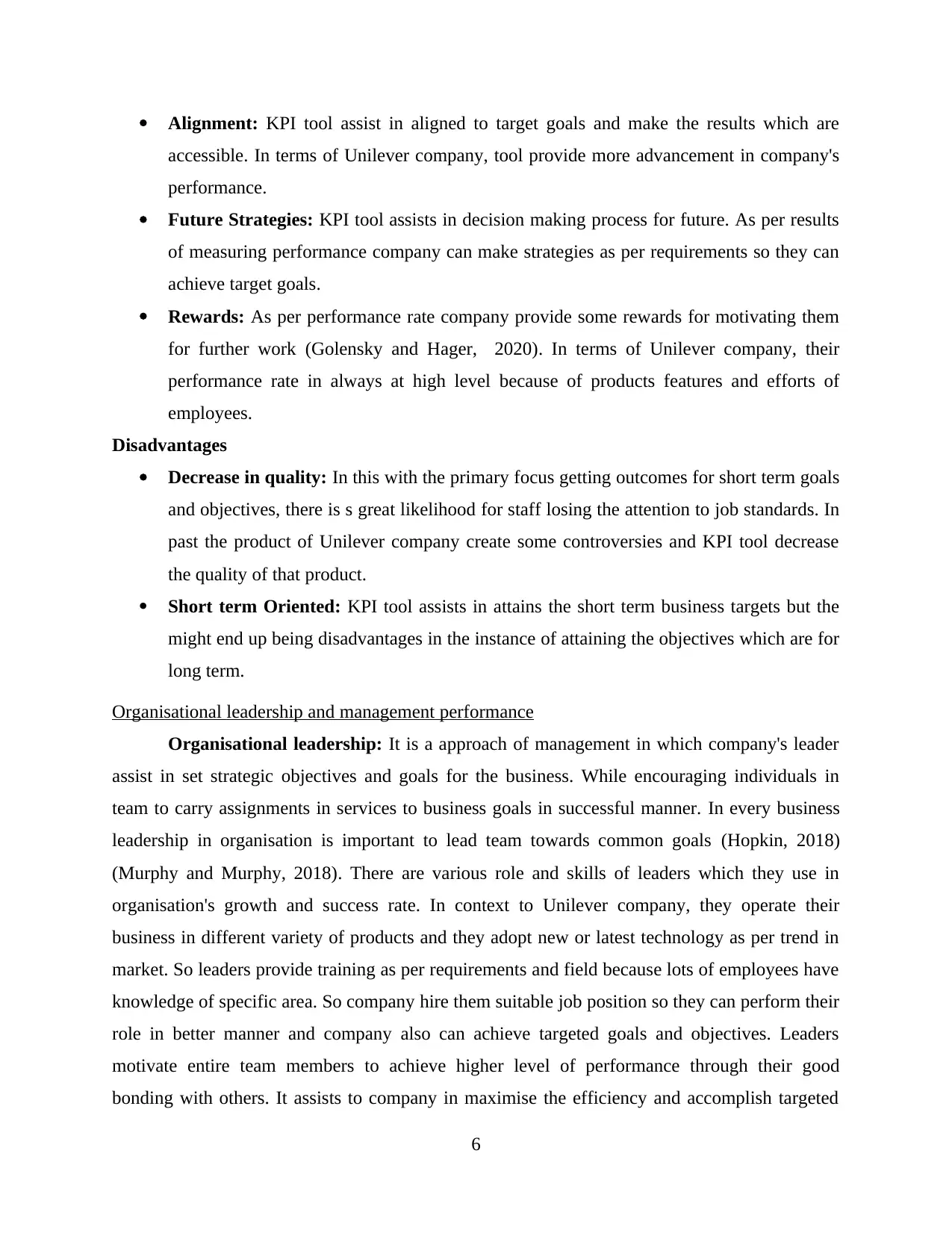
Alignment: KPI tool assist in aligned to target goals and make the results which are
accessible. In terms of Unilever company, tool provide more advancement in company's
performance.
Future Strategies: KPI tool assists in decision making process for future. As per results
of measuring performance company can make strategies as per requirements so they can
achieve target goals.
Rewards: As per performance rate company provide some rewards for motivating them
for further work (Golensky and Hager, 2020). In terms of Unilever company, their
performance rate in always at high level because of products features and efforts of
employees.
Disadvantages
Decrease in quality: In this with the primary focus getting outcomes for short term goals
and objectives, there is s great likelihood for staff losing the attention to job standards. In
past the product of Unilever company create some controversies and KPI tool decrease
the quality of that product.
Short term Oriented: KPI tool assists in attains the short term business targets but the
might end up being disadvantages in the instance of attaining the objectives which are for
long term.
Organisational leadership and management performance
Organisational leadership: It is a approach of management in which company's leader
assist in set strategic objectives and goals for the business. While encouraging individuals in
team to carry assignments in services to business goals in successful manner. In every business
leadership in organisation is important to lead team towards common goals (Hopkin, 2018)
(Murphy and Murphy, 2018). There are various role and skills of leaders which they use in
organisation's growth and success rate. In context to Unilever company, they operate their
business in different variety of products and they adopt new or latest technology as per trend in
market. So leaders provide training as per requirements and field because lots of employees have
knowledge of specific area. So company hire them suitable job position so they can perform their
role in better manner and company also can achieve targeted goals and objectives. Leaders
motivate entire team members to achieve higher level of performance through their good
bonding with others. It assists to company in maximise the efficiency and accomplish targeted
6
accessible. In terms of Unilever company, tool provide more advancement in company's
performance.
Future Strategies: KPI tool assists in decision making process for future. As per results
of measuring performance company can make strategies as per requirements so they can
achieve target goals.
Rewards: As per performance rate company provide some rewards for motivating them
for further work (Golensky and Hager, 2020). In terms of Unilever company, their
performance rate in always at high level because of products features and efforts of
employees.
Disadvantages
Decrease in quality: In this with the primary focus getting outcomes for short term goals
and objectives, there is s great likelihood for staff losing the attention to job standards. In
past the product of Unilever company create some controversies and KPI tool decrease
the quality of that product.
Short term Oriented: KPI tool assists in attains the short term business targets but the
might end up being disadvantages in the instance of attaining the objectives which are for
long term.
Organisational leadership and management performance
Organisational leadership: It is a approach of management in which company's leader
assist in set strategic objectives and goals for the business. While encouraging individuals in
team to carry assignments in services to business goals in successful manner. In every business
leadership in organisation is important to lead team towards common goals (Hopkin, 2018)
(Murphy and Murphy, 2018). There are various role and skills of leaders which they use in
organisation's growth and success rate. In context to Unilever company, they operate their
business in different variety of products and they adopt new or latest technology as per trend in
market. So leaders provide training as per requirements and field because lots of employees have
knowledge of specific area. So company hire them suitable job position so they can perform their
role in better manner and company also can achieve targeted goals and objectives. Leaders
motivate entire team members to achieve higher level of performance through their good
bonding with others. It assists to company in maximise the efficiency and accomplish targeted
6
⊘ This is a preview!⊘
Do you want full access?
Subscribe today to unlock all pages.

Trusted by 1+ million students worldwide
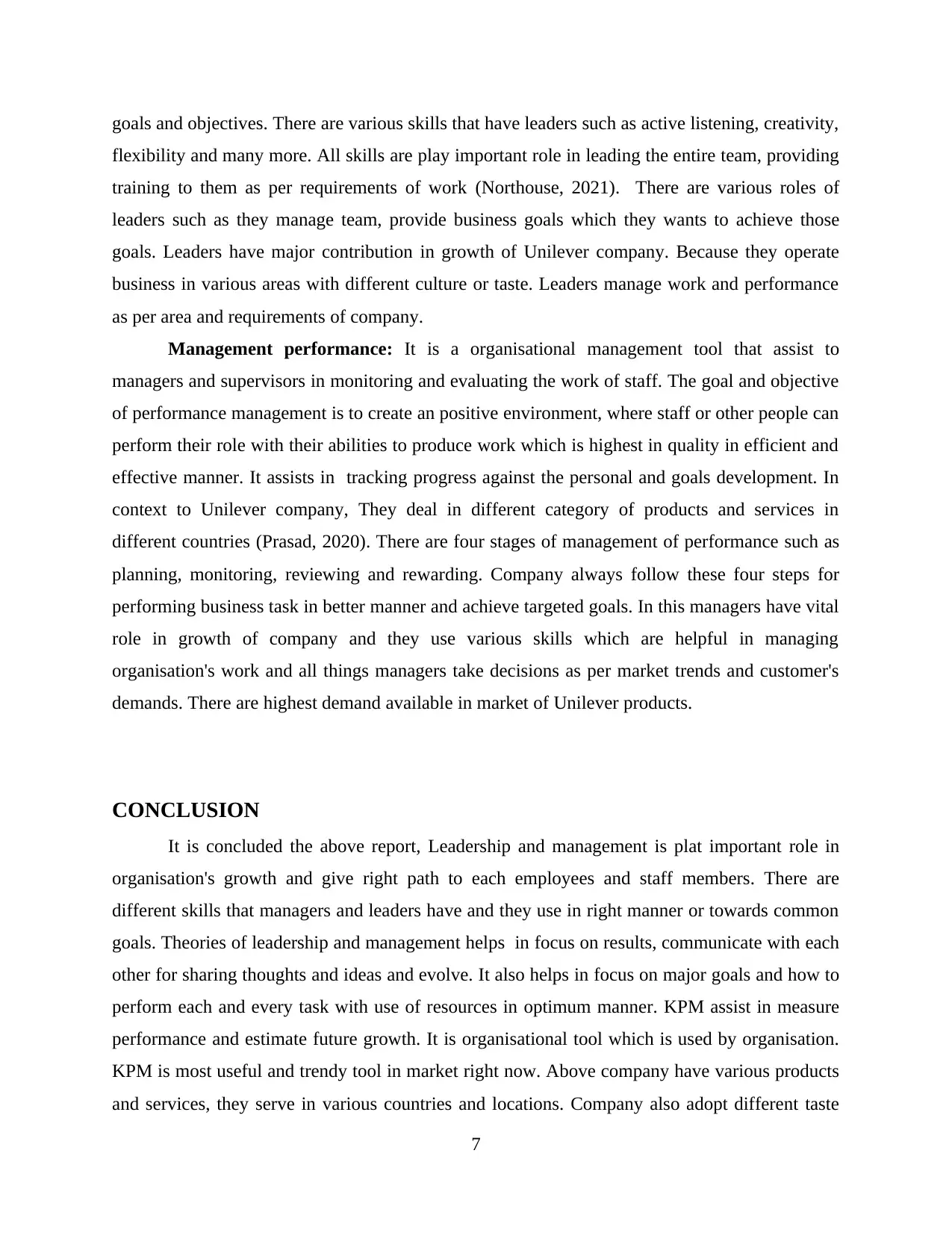
goals and objectives. There are various skills that have leaders such as active listening, creativity,
flexibility and many more. All skills are play important role in leading the entire team, providing
training to them as per requirements of work (Northouse, 2021). There are various roles of
leaders such as they manage team, provide business goals which they wants to achieve those
goals. Leaders have major contribution in growth of Unilever company. Because they operate
business in various areas with different culture or taste. Leaders manage work and performance
as per area and requirements of company.
Management performance: It is a organisational management tool that assist to
managers and supervisors in monitoring and evaluating the work of staff. The goal and objective
of performance management is to create an positive environment, where staff or other people can
perform their role with their abilities to produce work which is highest in quality in efficient and
effective manner. It assists in tracking progress against the personal and goals development. In
context to Unilever company, They deal in different category of products and services in
different countries (Prasad, 2020). There are four stages of management of performance such as
planning, monitoring, reviewing and rewarding. Company always follow these four steps for
performing business task in better manner and achieve targeted goals. In this managers have vital
role in growth of company and they use various skills which are helpful in managing
organisation's work and all things managers take decisions as per market trends and customer's
demands. There are highest demand available in market of Unilever products.
CONCLUSION
It is concluded the above report, Leadership and management is plat important role in
organisation's growth and give right path to each employees and staff members. There are
different skills that managers and leaders have and they use in right manner or towards common
goals. Theories of leadership and management helps in focus on results, communicate with each
other for sharing thoughts and ideas and evolve. It also helps in focus on major goals and how to
perform each and every task with use of resources in optimum manner. KPM assist in measure
performance and estimate future growth. It is organisational tool which is used by organisation.
KPM is most useful and trendy tool in market right now. Above company have various products
and services, they serve in various countries and locations. Company also adopt different taste
7
flexibility and many more. All skills are play important role in leading the entire team, providing
training to them as per requirements of work (Northouse, 2021). There are various roles of
leaders such as they manage team, provide business goals which they wants to achieve those
goals. Leaders have major contribution in growth of Unilever company. Because they operate
business in various areas with different culture or taste. Leaders manage work and performance
as per area and requirements of company.
Management performance: It is a organisational management tool that assist to
managers and supervisors in monitoring and evaluating the work of staff. The goal and objective
of performance management is to create an positive environment, where staff or other people can
perform their role with their abilities to produce work which is highest in quality in efficient and
effective manner. It assists in tracking progress against the personal and goals development. In
context to Unilever company, They deal in different category of products and services in
different countries (Prasad, 2020). There are four stages of management of performance such as
planning, monitoring, reviewing and rewarding. Company always follow these four steps for
performing business task in better manner and achieve targeted goals. In this managers have vital
role in growth of company and they use various skills which are helpful in managing
organisation's work and all things managers take decisions as per market trends and customer's
demands. There are highest demand available in market of Unilever products.
CONCLUSION
It is concluded the above report, Leadership and management is plat important role in
organisation's growth and give right path to each employees and staff members. There are
different skills that managers and leaders have and they use in right manner or towards common
goals. Theories of leadership and management helps in focus on results, communicate with each
other for sharing thoughts and ideas and evolve. It also helps in focus on major goals and how to
perform each and every task with use of resources in optimum manner. KPM assist in measure
performance and estimate future growth. It is organisational tool which is used by organisation.
KPM is most useful and trendy tool in market right now. Above company have various products
and services, they serve in various countries and locations. Company also adopt different taste
7
Paraphrase This Document
Need a fresh take? Get an instant paraphrase of this document with our AI Paraphraser
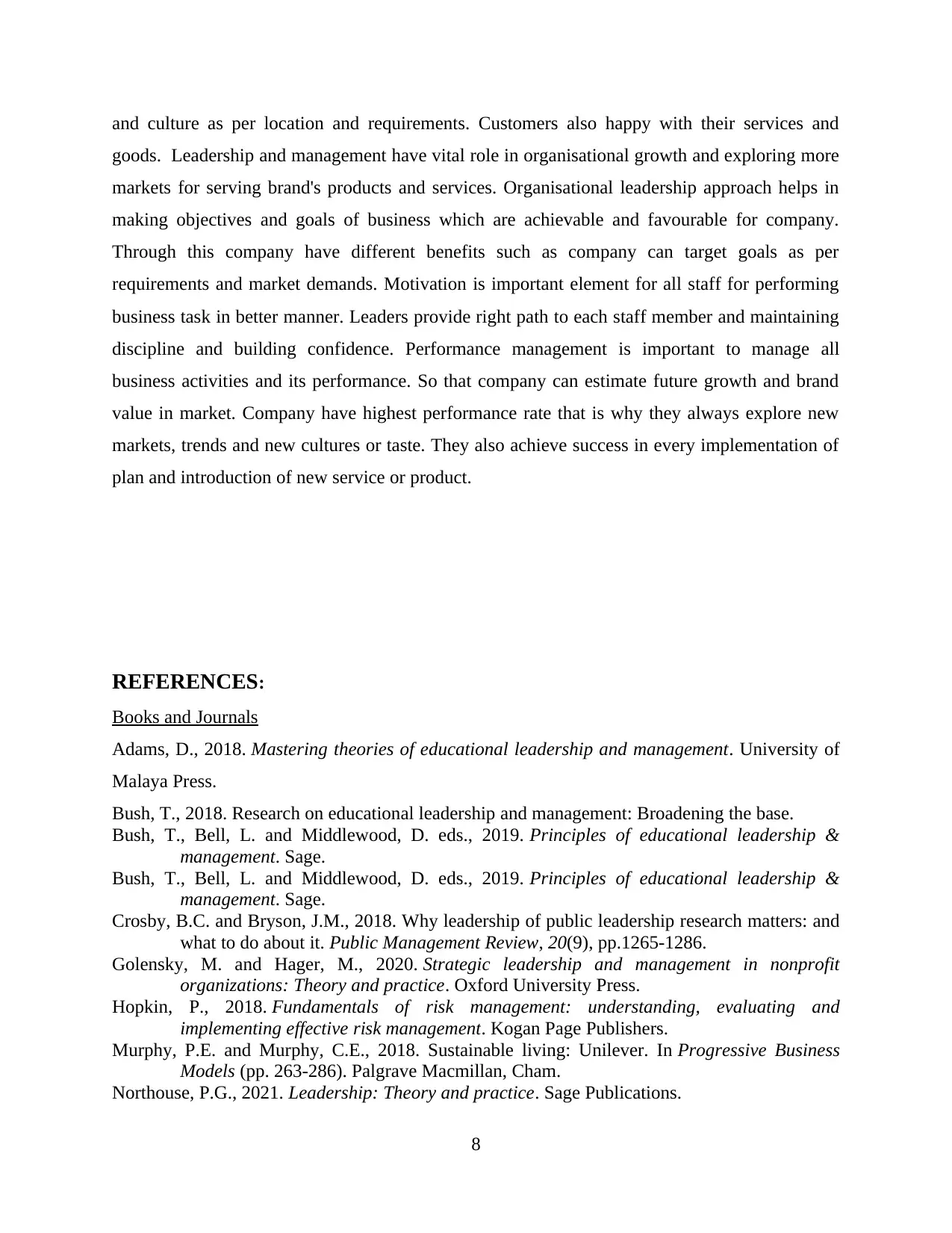
and culture as per location and requirements. Customers also happy with their services and
goods. Leadership and management have vital role in organisational growth and exploring more
markets for serving brand's products and services. Organisational leadership approach helps in
making objectives and goals of business which are achievable and favourable for company.
Through this company have different benefits such as company can target goals as per
requirements and market demands. Motivation is important element for all staff for performing
business task in better manner. Leaders provide right path to each staff member and maintaining
discipline and building confidence. Performance management is important to manage all
business activities and its performance. So that company can estimate future growth and brand
value in market. Company have highest performance rate that is why they always explore new
markets, trends and new cultures or taste. They also achieve success in every implementation of
plan and introduction of new service or product.
REFERENCES:
Books and Journals
Adams, D., 2018. Mastering theories of educational leadership and management. University of
Malaya Press.
Bush, T., 2018. Research on educational leadership and management: Broadening the base.
Bush, T., Bell, L. and Middlewood, D. eds., 2019. Principles of educational leadership &
management. Sage.
Bush, T., Bell, L. and Middlewood, D. eds., 2019. Principles of educational leadership &
management. Sage.
Crosby, B.C. and Bryson, J.M., 2018. Why leadership of public leadership research matters: and
what to do about it. Public Management Review, 20(9), pp.1265-1286.
Golensky, M. and Hager, M., 2020. Strategic leadership and management in nonprofit
organizations: Theory and practice. Oxford University Press.
Hopkin, P., 2018. Fundamentals of risk management: understanding, evaluating and
implementing effective risk management. Kogan Page Publishers.
Murphy, P.E. and Murphy, C.E., 2018. Sustainable living: Unilever. In Progressive Business
Models (pp. 263-286). Palgrave Macmillan, Cham.
Northouse, P.G., 2021. Leadership: Theory and practice. Sage Publications.
8
goods. Leadership and management have vital role in organisational growth and exploring more
markets for serving brand's products and services. Organisational leadership approach helps in
making objectives and goals of business which are achievable and favourable for company.
Through this company have different benefits such as company can target goals as per
requirements and market demands. Motivation is important element for all staff for performing
business task in better manner. Leaders provide right path to each staff member and maintaining
discipline and building confidence. Performance management is important to manage all
business activities and its performance. So that company can estimate future growth and brand
value in market. Company have highest performance rate that is why they always explore new
markets, trends and new cultures or taste. They also achieve success in every implementation of
plan and introduction of new service or product.
REFERENCES:
Books and Journals
Adams, D., 2018. Mastering theories of educational leadership and management. University of
Malaya Press.
Bush, T., 2018. Research on educational leadership and management: Broadening the base.
Bush, T., Bell, L. and Middlewood, D. eds., 2019. Principles of educational leadership &
management. Sage.
Bush, T., Bell, L. and Middlewood, D. eds., 2019. Principles of educational leadership &
management. Sage.
Crosby, B.C. and Bryson, J.M., 2018. Why leadership of public leadership research matters: and
what to do about it. Public Management Review, 20(9), pp.1265-1286.
Golensky, M. and Hager, M., 2020. Strategic leadership and management in nonprofit
organizations: Theory and practice. Oxford University Press.
Hopkin, P., 2018. Fundamentals of risk management: understanding, evaluating and
implementing effective risk management. Kogan Page Publishers.
Murphy, P.E. and Murphy, C.E., 2018. Sustainable living: Unilever. In Progressive Business
Models (pp. 263-286). Palgrave Macmillan, Cham.
Northouse, P.G., 2021. Leadership: Theory and practice. Sage Publications.
8
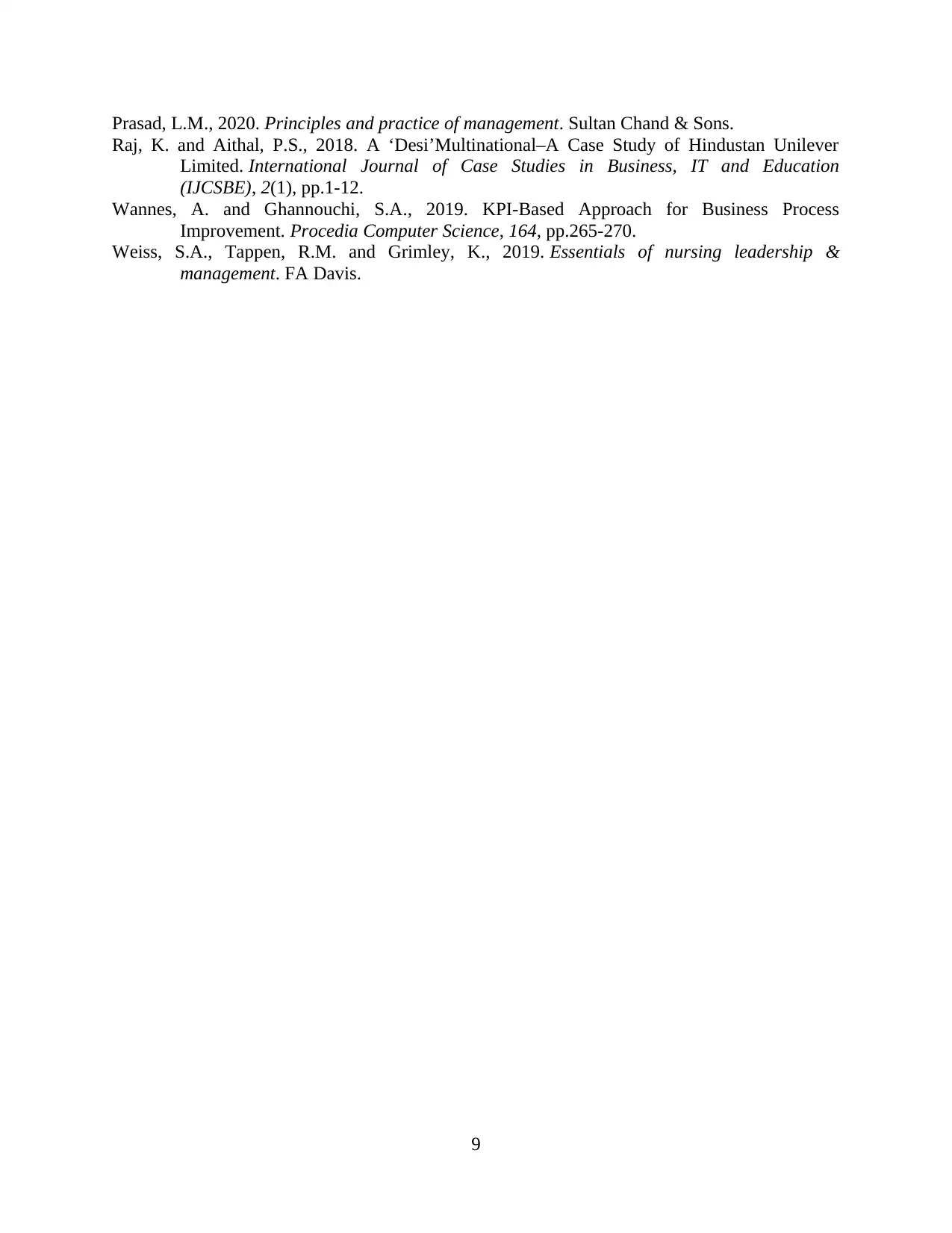
Prasad, L.M., 2020. Principles and practice of management. Sultan Chand & Sons.
Raj, K. and Aithal, P.S., 2018. A ‘Desi’Multinational–A Case Study of Hindustan Unilever
Limited. International Journal of Case Studies in Business, IT and Education
(IJCSBE), 2(1), pp.1-12.
Wannes, A. and Ghannouchi, S.A., 2019. KPI-Based Approach for Business Process
Improvement. Procedia Computer Science, 164, pp.265-270.
Weiss, S.A., Tappen, R.M. and Grimley, K., 2019. Essentials of nursing leadership &
management. FA Davis.
9
Raj, K. and Aithal, P.S., 2018. A ‘Desi’Multinational–A Case Study of Hindustan Unilever
Limited. International Journal of Case Studies in Business, IT and Education
(IJCSBE), 2(1), pp.1-12.
Wannes, A. and Ghannouchi, S.A., 2019. KPI-Based Approach for Business Process
Improvement. Procedia Computer Science, 164, pp.265-270.
Weiss, S.A., Tappen, R.M. and Grimley, K., 2019. Essentials of nursing leadership &
management. FA Davis.
9
⊘ This is a preview!⊘
Do you want full access?
Subscribe today to unlock all pages.

Trusted by 1+ million students worldwide
1 out of 12
Related Documents
Your All-in-One AI-Powered Toolkit for Academic Success.
+13062052269
info@desklib.com
Available 24*7 on WhatsApp / Email
![[object Object]](/_next/static/media/star-bottom.7253800d.svg)
Unlock your academic potential
Copyright © 2020–2025 A2Z Services. All Rights Reserved. Developed and managed by ZUCOL.





